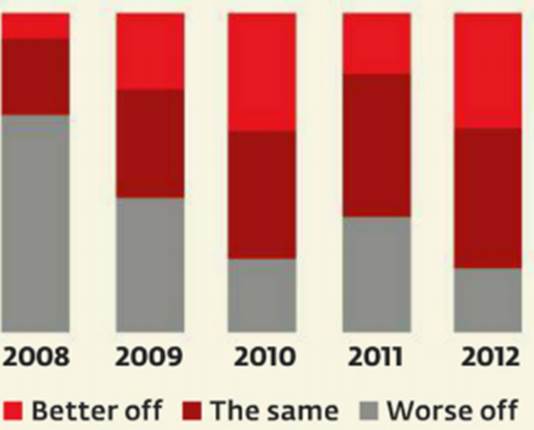Folks in retirement or
nearing that milestone have bit news to cheer. A recent retirement survey of
online subscribers by the Consumer Reports National Research Center found that
the average retirement-account balance rose by 6 percentage points in the past
year, the largest gain we’ve measured since the financial crisis hit in 2008.

Hobbies help you maintain your identity
post-career
But if you’re feeling
buoyed enough to start your countdown to retirement, take note: Our survey also
identified three factors- not all monetary-that can undermine retirement satisfaction.
Here’s how to address them:
Set money boundaries
Create realistic
financial limits with your adult children, especially those more likely to seek
your help. Retirees in our survey who reported family concerns had less
positive experiences after retiring than those who didn’t. And leading the list
of such concerns was financial support for adult children (17 percent) and
elderly parents (3 percent). Our readers were generous, providing a median of
$8,990 annually to family members.
J. Gallo, an estate
attorney in Los Angeles, and his wife, E. Gallo, a psychotherapist, have
written two books on family financial literacy. They say that for adult
children, four types of expenses are worth paying for, at least in the short
run, because they can foster independence: tuition, vocational testing, health
insurance, and specialized services, such as psychiatry and treatment for
substance abuse.

You should communicate your expectations
up front and set monetary and time boundaries in writing
With any subsidy, the
Gallos say, you should communicate your expectations up front and set monetary
and time boundaries in writing. For example, if your son wants to live at home
to save money, he should tell you how he plans to earn money, what he’s saving
for, and when he’ll be leaving.
In the interim, you
can charge rent, assign chores, and even require that he pay interest if you
decide to give him a loan. If the money you provide is a gift, limit the amount
but don’t attach strings.
Get your house in order.
Address your housing
situation well before retirement. Our survey found that only 43 percent of
respondents who felt stuck in their homes were highly satisfied with their
retirement, compared with 71 percent who didn’t fell stuck. Seven percent of
respondents said they wanted to sell or downsize but couldn’t.
A home that’s selling
for just a bit less than comparable in your area will sell more quickly,
real-estate experts say. Pricing it at a round number – say, $250,000 rather
than $249,000 will get the attention of buyers searching online for homes up to
$250,000 and above. And consider improvements that might help you sell.
Remodeling magazine’s 2011 – 2012 list of home-improvement cost-to-value
figures includes several projects that can add to curb appeal: a steel entry
door (73 percent of the cost might be recouped), a garage-door replacement (72
percent), a wood deck (70 percent), and vinyl siding (70 percent).
Reach out
Plan for hobbies or a
second career to ease the transition into retirement. Our survey found that
letting go of a familiar identity, say, as an employee of a company or member
of a profession, can take its toll. Survey respondents who reported a loss of
identity in retirement were only one-third as likely to be highly satisfied as
those who felt no such loss. That gap didn’t vary with income.
Nella G. Barkley, CEO
of Crystal Barkley, a life- and career-coaching company in Charleston, S.C.,
offers this suggestion: First, list your “inventory of skills,” such as
troubleshooting or the ability to direct groups in decision-making. Ask others
to evaluate you, too, for fresh perspectives.

Nella G. Barkley, CEO of Crystal Barkley: First, list
your “inventory of skills,”
Match those skills
with pursuits – either paid or unpaid – you’d like to try. An accountant who
wants to play in a jazz band, for instance, might first offer book-keeping
services to one, which could lead to informal jamming and maybe performances.
Researching your interest will help you find people doing what you’d like to
do. “Then,” Barkley says, “you get sent to the other people who are active in
that world, and your knowledge grows.”
How are you doing? Better.
Thirty-six percent of
subscribers told us they were better off financially than they were a year ago,
and 20 percent reported being worse off. That’s a reversal from the results of
our 2011 survey. Here’s how our subscribers’ fortunes have fared since the 2008
financial crisis started.

Thirty-six percent of subscribers told
us they were better off financially than they were a year ago, and 20 percent
reported being worse off.